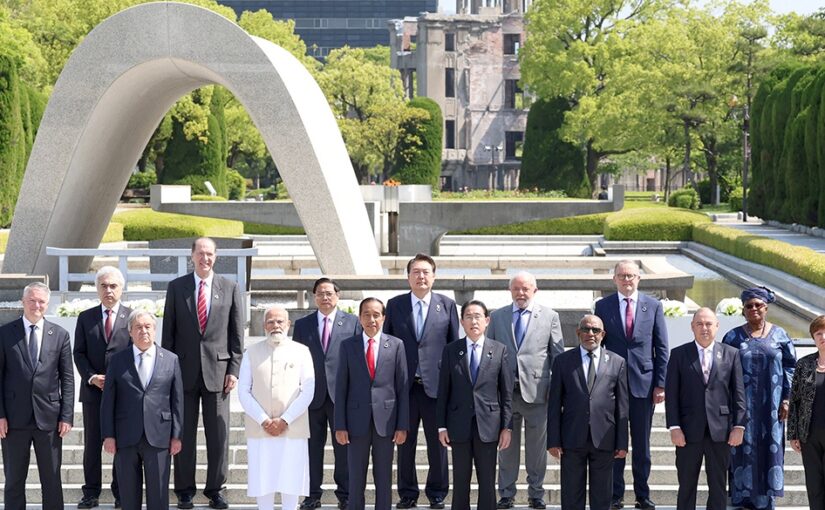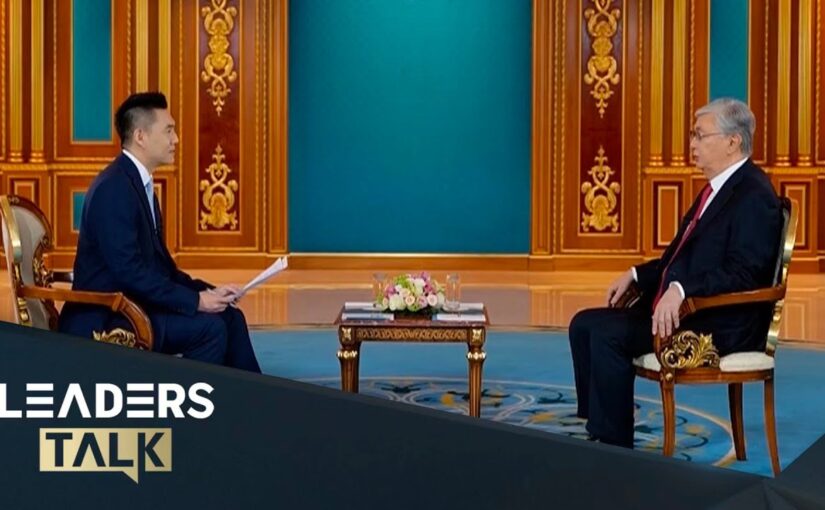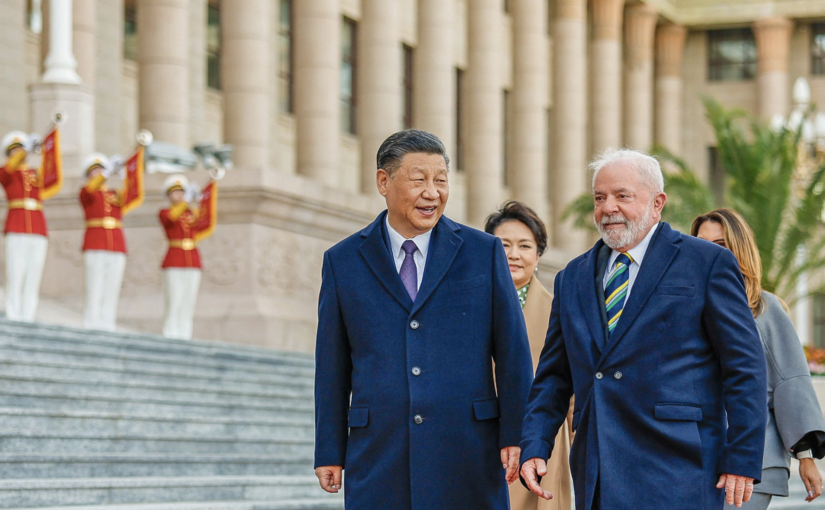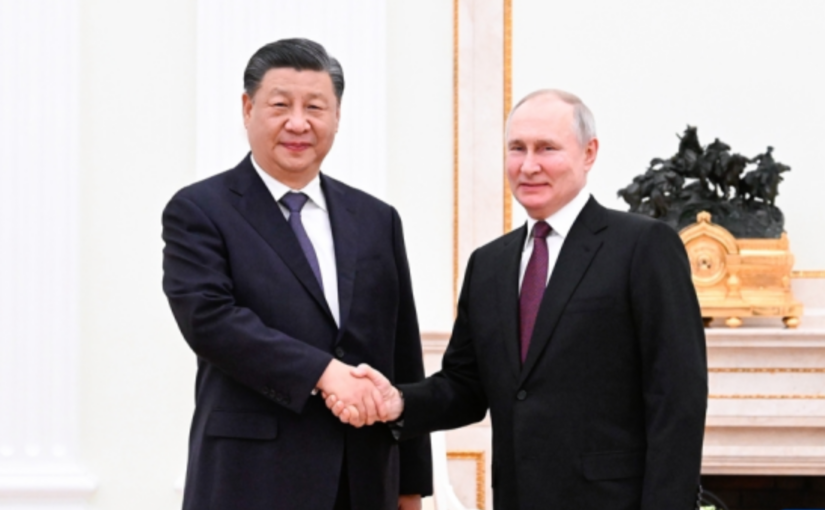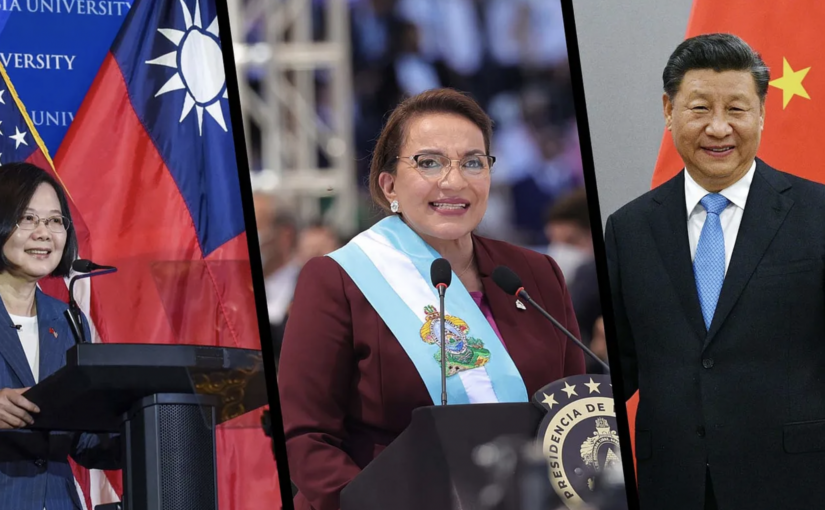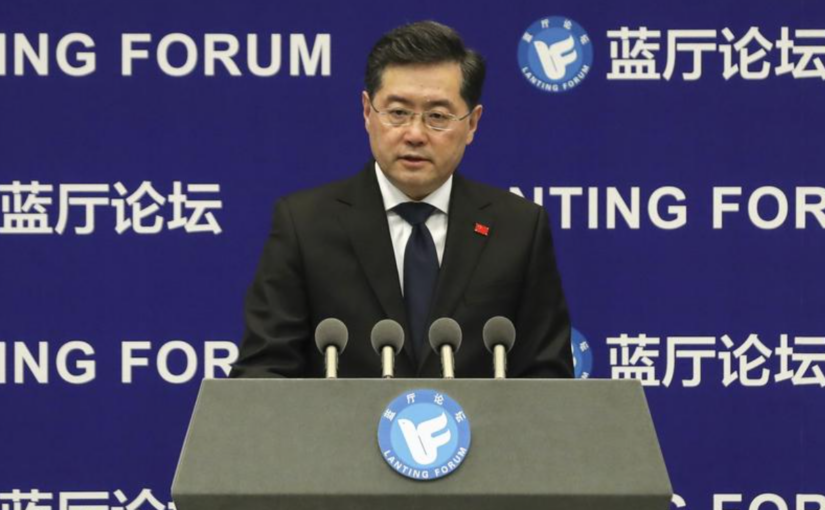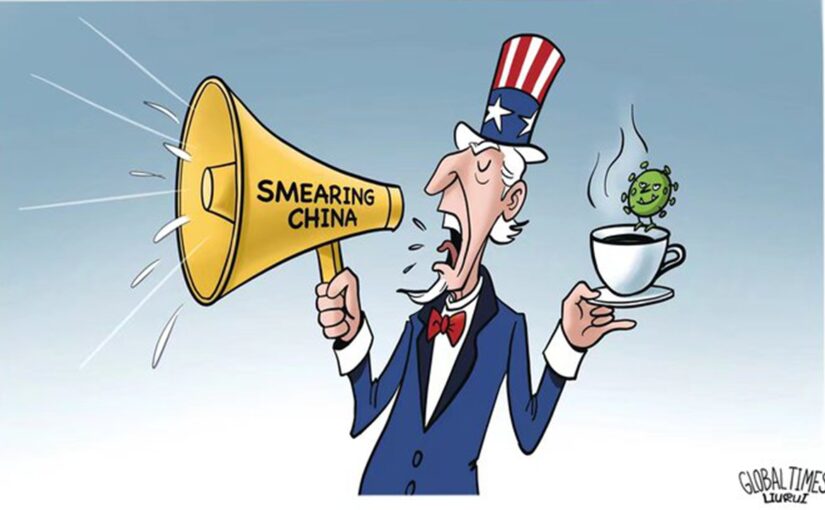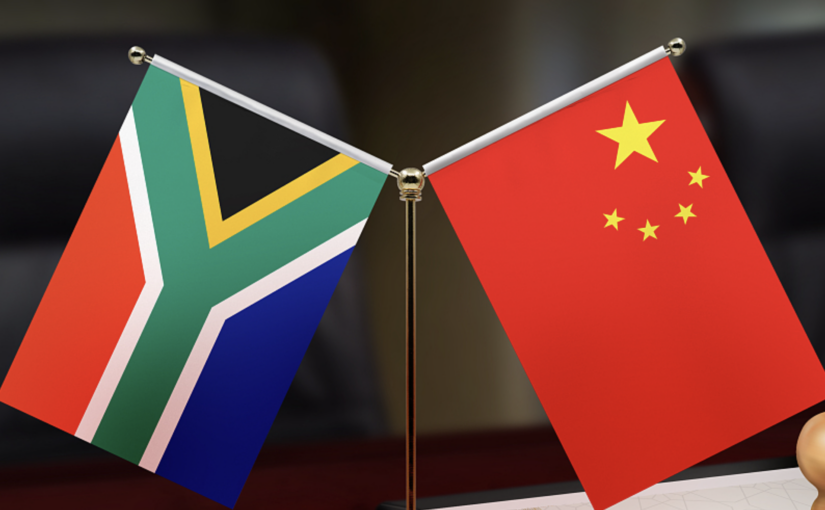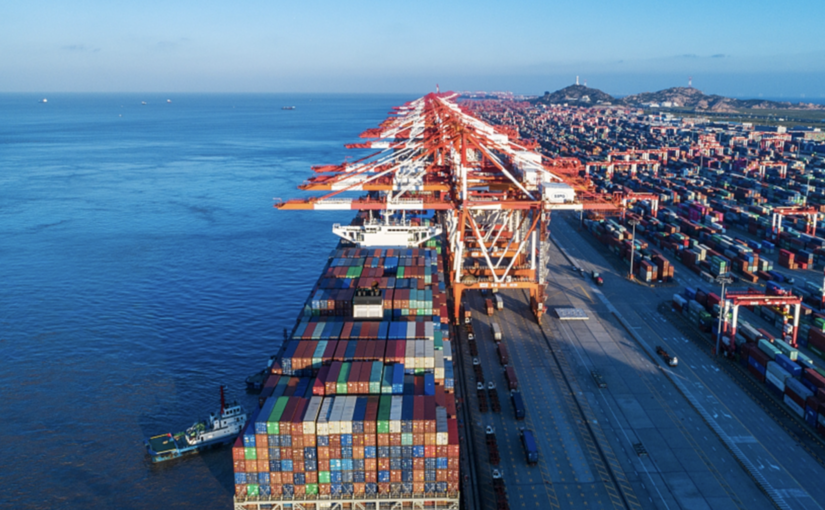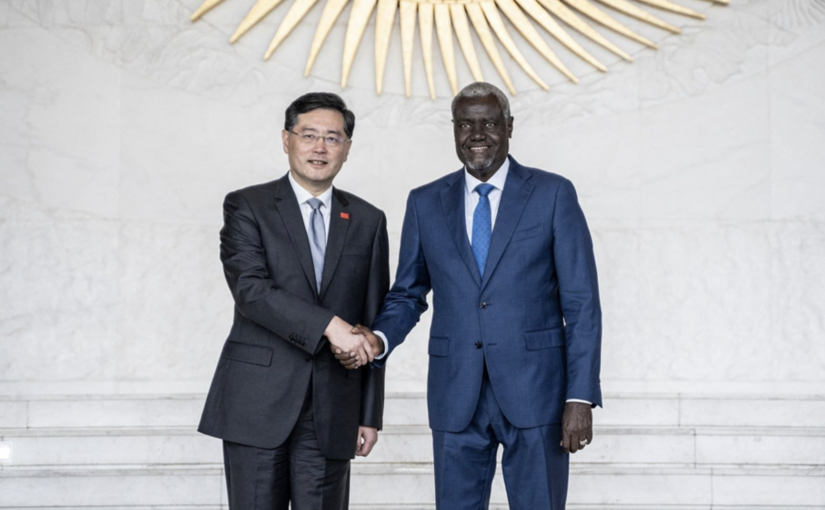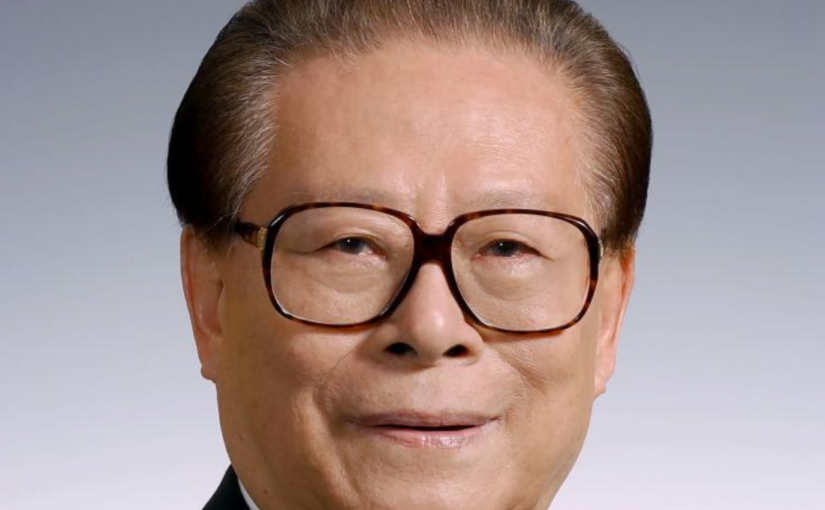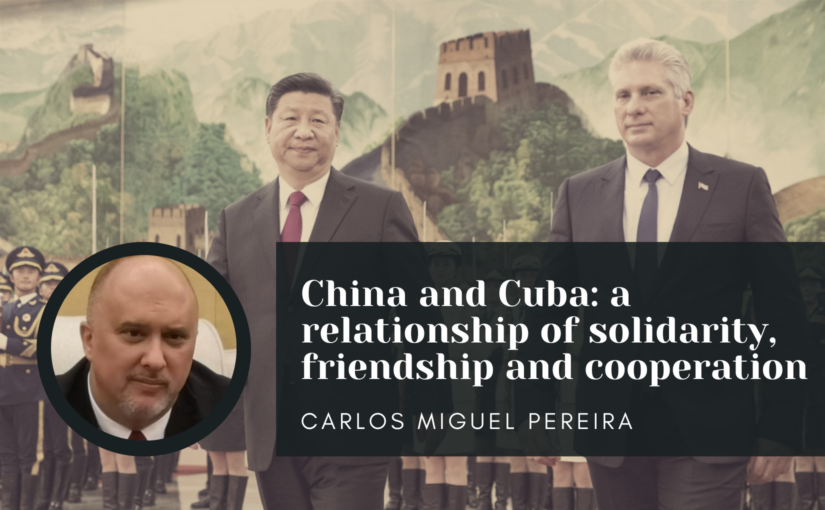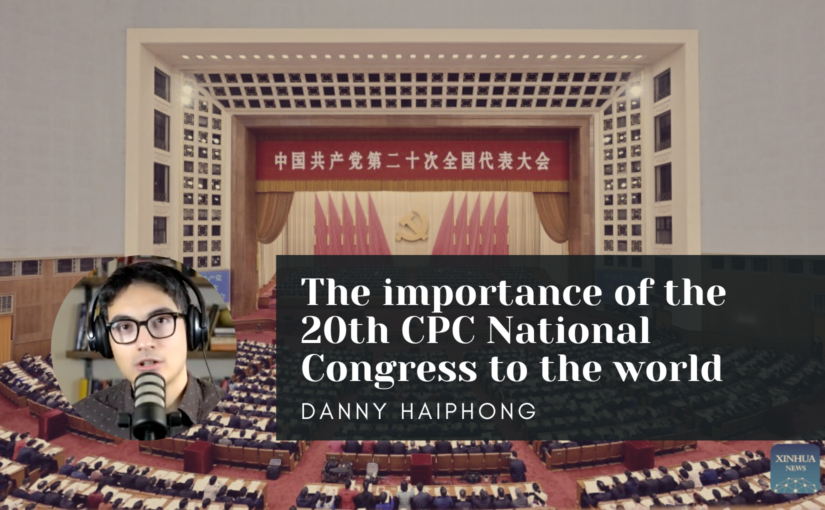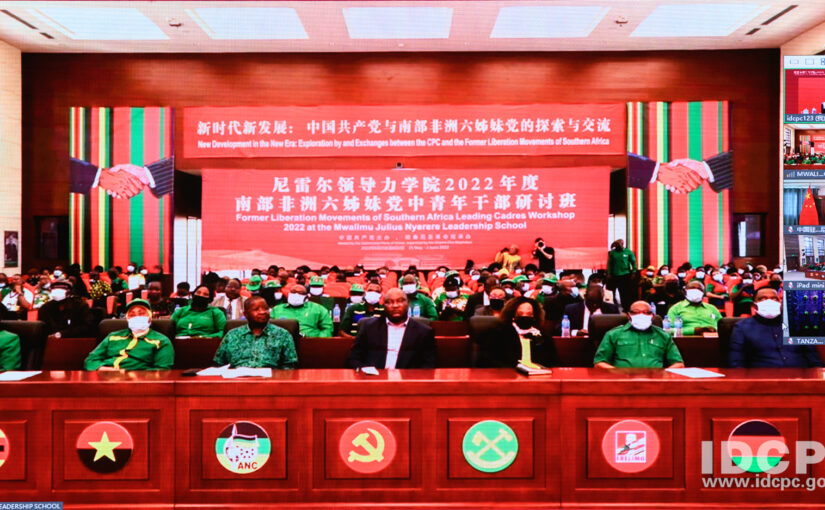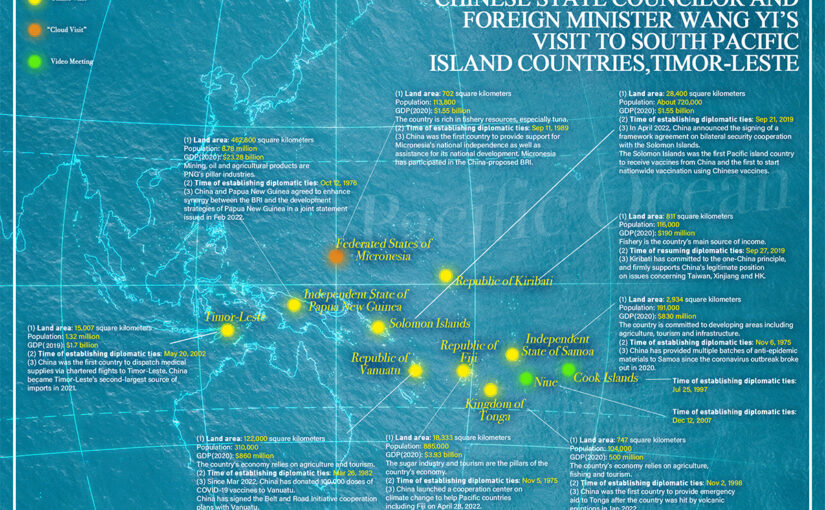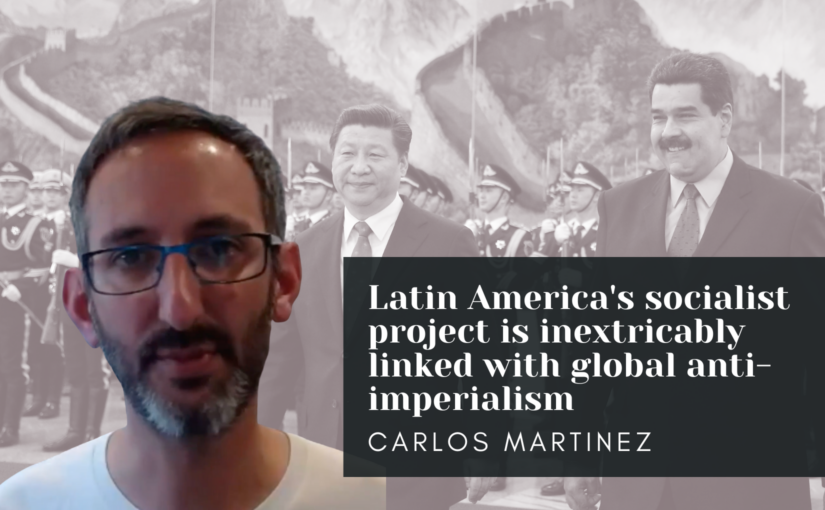We are pleased to republish, from Monthly Review (MR) Online, this interesting discussion article by Professor Cheng Yawen, from the School of International Relations and Public Affairs, Shanghai International Studies University, previously carried by Culture Vertical and China Environment News.
According to Professor Cheng, the conflict in Ukraine marks the end of the US-led globalisation wave. As a result, China urgently needs to make a new choice in its diplomatic and strategic priorities to downgrade the importance of Europe and the US and to promote a new international system based on South-South cooperation. He says that whilst many people believe globalisation to be irreversible, the question still needs to be posed as to what to do should a full decoupling occur in the future. Events in Ukraine mean that China no longer has the peaceful external environment it has enjoyed for the past 40 years. This necessitates a greater focus on other developing countries, who, in turn, need to break from dependence on western countries and intensify cooperation amongst themselves. Drawing on Mao Zedong’s thesis of surrounding the cities from the countryside, Professor Cheng notes that: “The Russia-Ukraine conflict and the West’s unrelenting sanctions against Russia further highlight the fact that most of the world’s countries are in the ‘countryside’ on the periphery, while a few are in the ‘city’ in the centre, and the United States is the ‘city centre.’”
Outlining how, since the days of the Communist International, and through all subsequent phases, the Chinese revolution has advanced in close coordination with the movements of oppressed nations and peoples, Professor Cheng shows in detail how South-South cooperation has actually become more realistic today.
Introduction
Since the change of China and the United States in 2018, the world situation has been in turmoil, and various “decoupling theories” have become popular at home and abroad. Especially since the Russia-Ukraine conflict, the international situation has become clearly camped, and the United States is targeting China from all aspects of domestic and foreign affairs. Although many people believe that globalization is irreversible and do not believe that there will be a day of full decoupling, how should we respond if full decoupling does occur in the future?
This article argues that the Russia-Ukraine conflict is a landmark event in the end of U.S.-led globalization, meaning that China no longer has the peaceful external development environment it has enjoyed for the past 40 years. In the future China will have to promote a new global system, a “three-ring” international system that will guarantee China’s national security and development: the first ring is China’s neighboring East Asia, Central Asia and the Middle East, with which China has formed a close industrial division of labor and through which it obtains a stable energy supply and a reliable security barrier. The second ring is the developing countries of Asia, Africa and Latin America, with which China exchanges raw materials and industrial goods and assists their development; the third ring extends to the traditional industrialized countries, mainly in Europe and the United States. The “first ring” is the key to China’s construction of a “new three-ring” international system. In recent decades, a new global system has been formed among developing countries in Asia, Africa, and Latin America, and the solid foundation formed by developing countries in terms of economic volume, trade exchanges, and economic cooperation is not what it used to be, but in order to further enhance their economic and political autonomy, they must break away from their financial and monetary dependence on Western countries. Therefore, to build a “new three-ring” international system, developing countries should also develop higher-level and broader financial and monetary cooperation among themselves.
Russia’s “special military operation” against Ukraine, and the ensuing full-scale confrontation between the West and Russia, is a landmark event in the end of the globalization tide that has been underway since the 1980s. The U.S. is holding its allies hostage to impose deadly sanctions on Russia and forcing the rest of the world to choose sides between the West and Russia, which has led to a recurrence of the deadly struggle of a century ago and poses a huge challenge to China. The “end of globalization” has left China without the external development environment it has had for the past four decades, and the U.S. push to rebuild its dominant international system and “decouple” from China and Russia is likely to intensify in the future. Today’s world is characterized by a paradigm shift. Faced with the possibility of a passive and comprehensive decoupling, China needs to take the initiative to make adjustments in its foreign strategic arrangements and make new choices in its national engagement priorities in order to shape a new international system that is conducive to counteracting the negative effects of the West’s decoupling of China.
In the thirty years since the collapse of the Soviet Union, Russia has gone from an initial active approach to the United States and the West, to a gradual alienation from them, to the current unrelentingly fierce confrontation, highlighting the political limits of globalization. Contrary to the romantic imagination of globalization, the latest round of globalization was initially an investment of U.S. hegemony, partly serving the purpose of dismantling the Soviet Union and the socialist camp, which determined that it could not be expanded indefinitely. In terms of the relationship between the leading and following countries of globalization, or between developed and developing countries, there are equal limits to international politics: when globalization backfires on its initiators and threatens their power advantage, globalization will inevitably be “reversed” and the path of operation will be redesigned. The process of globalization in recent decades and the pursuit of U.S. power dominance are the two sides of the same coin, and they are mutually conditional and mutually reinforcing. Russia’s “special military operation” against Ukraine is the result of this round of globalization, which has fully exposed its true nature of power and put an end to the U.S.-led globalization.
NATO’s expansion to the east is the main reason for Russia’s initiative. It appears to be a security issue, but in fact it is also an economic issue in the process of globalization. Peripheralization of the Soviet Union in the global system is the goal of the U.S.-initiated globalization process, and Russia’s intention to use globalization to achieve national renaissance and become a center-state clearly runs right counter to its occurrence and evolutionary logic. The interest of global capital, especially financial capital, in Russia is more focused on energy, food and minerals, which are the areas from which financial capital can make huge profits. But since Putin took power, Russia has strengthened its control over key industries that are crucial to national security and basic livelihoods, and is committed to building the Eurasian Economic Union and shaping an economic development space that is suitable for itself, something that external capital is not happy about. NATO’s expansion to the east is a manifestation of capital’s swaying politics to achieve market expansion, which continues to squeeze Russia’s development space and intensify Russia’s peripheralization. If no effective response is made, Russia will be further defined as a provider of primary products, lose its ability to participate in great power politics, and even have an internal crisis. This is what the Russian elite does not want to see.
NATO’s expansion to the east and the current Western sanctions against Russia have revealed the power structure of the contemporary world. “After the end of World War II, the European colonial system gradually collapsed, and the explicit rule of the international order since the second half of the 20th century was centered on the United Nations and international law, which embodied the principle of sovereign equality of states. However, the central-peripheral hierarchical international order under the European colonial system has not really disappeared, but has continued as a subtle rule and hidden order, except that the absolute hierarchical power relations characterized by direct drives in the past no longer exist, and have been replaced by a “common but differentiated” international order, i.e., all countries are sovereign and equal on the surface. In other words, all states are sovereign and equal, but in practice there are still differences in power. The “rule-based order” is the main expression of this order, in which all countries are required to follow the same rules, but the real meaning of these rules is not centered on the United Nations and international law, but on the Western countries.
The U.S. hegemony since the post-war period and the G-7 established after the 1970s are the main manifestations of the contemporary version of the global center-fringe order. The annual meeting of the G-7 discusses not only the affairs of seven countries, but also the affairs of the whole world, and they negotiate and then promote the transformation into global rules. The “rule-based order” is actually “an order based on the rules set by the West”, and it is the key who is the rule-maker. In a global division of labor system, rule-making, money supply and industrial goods production are the business of a few countries at the center, and if other countries want to join in, they risk dismantling the dominant position of a few countries, which is something countries that hold rule-making and monetary dominance and maintain technological superiority with intellectual property rights do not want to see. China’s unexpected economic growth in recent decades has disrupted the post-war center-periphery international order and threatened the unspoken rules centered on Western countries. The main reason for this is that China’s development has touched the cheese of the United States and other Western countries, which never envisioned that China could also “take center stage”, even if it is only “approaching” for now.
Whether it is the expansion of NATO to the east or the selection of China as a key target of the U.S. crackdown, it reflects that the U.S. and the West want to maintain and strengthen their own power advantage. The Russia-Ukraine conflict and the West’s unrelenting sanctions against Russia further highlight the fact that most of the world’s countries are in the “countryside” on the periphery, while a few are in the “city” in the center, and the United States is the “city center” in the global The “city center” of the “urban center”, the “city” does not want to see the “rural” like them The “cities” do not want to see the “countryside” become “cities” like them. The obstruction of the global “urban centers” by China and Russia lies both in their strong control over capital, which is the last two largest uncontrolled areas of capitalist globalization, and in the fact that they have become “urban centers” due to their much stronger state power compared to most countries. The two countries are also obstacles to the “urban centers” further controlling the “rural” fringes of the globe because they are much stronger than most countries. In this round of globalization, China, with its strong economic growth and overall increase in national power, has shown a tendency to move from the “rural” to the “urban” areas, and in contrast to its earlier overtures to globalization, the central countries have in recent years become “This has exposed the “common” limits of the post-war international order. The fact that China has become one of the “cities” is intolerable for the center-state.
In the first article of Selected Works of Mao Zedong, “Analysis of the Classes in Chinese Society,” the opening chapter poses the question: “Who are our enemies? Who are our friends? This question is the primary question of the revolution.” Over the past 40 years, China has carried out reform and opening up, and in recent years it has initiated the building of a community of human destiny. In its international exchanges, it no longer deliberately emphasizes the distinction between enemies and friends, but hopes to promote “beauty and commonwealth” in the “beauty of each, beauty of the beauty”. But can we achieve “commonwealth”? However, whether the world can achieve “commonwealth” is not determined by China’s wish alone. With the U.S.-led Western countries showing a full-scale confrontation with Russia and China, the contemporary world can no longer be considered mechanically as “peace and development”, but needs to seriously consider “competition” or even “war”. “Even if war can be ruled out, it is no longer possible to achieve better development in a globalized system dominated by Western countries. China has to rethink the “primary question” in its foreign dealings: who are the possible partners of China now and in the future, and who are the partners that China cannot pull in?
Things come together in groups, and people are divided by groups. The same is true for countries. Countries with similar experiences, situations and aspirations are more likely to form long-lasting cooperative relationships. In contemporary international relations discourse, Western vs. non-Western countries, developed vs. developing countries, and Northern vs. Southern countries are common distinctions between types of countries, with developed countries and Northern countries being mostly Western countries and Southern countries and developing countries being non-Western countries. Unlike the distinctions of developed vs. developing countries and North vs. South countries, which are economic in nature, the distinctions of Western vs. non-Western countries also point to political and cultural dimensions, implying global power relations. Since the nineteenth century, the world has undergone a “global transformation”: the formerly discrete “centerless, pluralistic world” has shifted to a highly interconnected and hierarchical “center-marginal” global system. The “imperialism” of the late 19th century and the revolutionary era of the first half of the 20th century is a description and characterization of the relationship between this order and the highly interconnected and hierarchical “center-periphery” global international system, of which the West was the center. Imperialism and globalization from the mid-to-late 19th century to the early 20th century were two sides of the same coin: imperialism came with globalization, and globalization strengthened imperialism, both of which together set up an “iron barrel formation” for countries on the periphery, from which it was very difficult to escape. The Western countries used to be the center of the global system and the place of imperialism, from which the colonial order of the modern world and the American hegemony since the middle and second half of the 20th century came; at the same time, many revolutions since modern times, including the anti-colonial movement in the middle and second half of the 20th century, were aimed at breaking this unequal and unjust center-marginal power structure.
In the center-fringe global power structure, the center states cannot sincerely help the revolution of the peripheral states, nor will they welcome the peripheral states to join the center states on an equal footing. During the Chinese revolution in the first half of the 20th century and the consolidation of power in the second half of the 20th century, the main external forces that China relied on were from the periphery of the global system. The Communist International network, in which the Chinese Communist Party was involved, was an alliance between the non-regime forces of the colonized and oppressed peoples of the time; in the war against Japan, China took the opportunity of its participation in the world war against fascism to continue the “anti-imperialist” demands of the previous Chinese revolution and to further promote the abolition of the various unequal rights imposed on China by the imperialist countries; in 1949, when the People’s Republic of China was founded, the Chinese government was able to achieve its goal. After the founding of the People’s Republic of China in 1949, China attached great importance to cooperation with “Third World” countries and supported the anti-colonial movement and post-independence nation-building in Asia, Africa and Latin America, especially its active participation in the Bandung Conference in 1955 and its proposal of the Five Principles of Peaceful Coexistence, which were well received by Asian, African and Latin American countries and became the basis for China’s cooperation with them. It also became an important point in the virtuous circle of relations between China and Asian, African and Latin American countries, and with the latter’s support and cooperation, China returned to the United Nations in 1971 and became a permanent member of the Security Council.
China’s mutual solidarity and assistance with Asian, African and Latin American countries in their resistance to colonial rule and nation-building have established a key feature of Chinese multilateralism in recent times, namely, the high priority given to cooperation with non-Western developing countries in defending national independence and development progress in their joint resistance to the unequal and unjust international order constructed by the central state. In its all-round diplomacy based on non-Western developing countries, China does not exclude its contacts and even the development of friendly and cooperative relations with developed Western countries and other major powers. However, it should also be noted that China’s past interactions and cooperation with the centerland countries have always been based on two premises: first, from China’s perspective, China insists on developing its foreign relations under the premise of independence, equality and reciprocity, and opposes the hierarchy of power in international relations; second, from the perspective of the centerland countries, their cooperation with China has always had a ceiling, which is not to shake the global power structure centered on the Western countries. structure. When either of these two premises changes, it will be difficult for China, as a developing country, to continue to develop cooperative relations with Western countries in depth, especially politically.
Over the past four decades, China has abandoned ideological differences and avoided differences in national systems, and has committed itself to cooperating with all countries, gradually forming a pattern of foreign relations in which “major powers are key, the periphery is primary, developing countries are fundamental, and multilateralism is an important stage. However, this pattern has encountered many obstacles when the time of “the end of globalization” comes. The “decoupling” of China’s economy, technology, knowledge, and people-to-people contacts, initiated by the U.S. with the help of other Western countries, is unlikely to be withdrawn by the war between Russia and Ukraine, but may be intensified.
Since the founding of the People’s Republic of China, it has undergone several changes in diplomatic direction, from the “one-sided” approach when the country was first established, to the “one line, one big area” and “three worlds” division in the 1970s, to the shift to reform and opening up after 1978, focusing on developing cooperation with Western countries. From the “one-sided” approach when the country was first founded, to the “one line, one big area” and “three worlds” division in the 1970s, to the shift to reform and opening up after 1978, focusing on developing cooperation with Western countries, all in response to the prevailing situation. At this time of “unprecedented changes”, Western countries are showing stronger and stronger intentions to suppress potential challengers, especially after the outbreak of the war between Russia and Ukraine, which has exposed the Western countries’ tendency to gather and suppress non-Western countries on all fronts, and will become a structural presence in international relations for a long time to come. China cannot help but be highly alert to the fact that the West’s omnipotent sanctions and repressive tactics against Russia will be applied to China in the future. For this reason, it is urgent to re-examine China’s past tradition of multilateralism, adjust the spatial pattern of its foreign relations, and strengthen cooperation with non-Western developing countries in order to create a new international environment conducive to safeguarding China’s national security and long-term development.
In 1974, Mao Zedong proposed the division of the “three worlds” and made an analysis of the three types of countries in the world at that time and the way China could interact with them, with the developing countries of the “third world” being the main target of China’s interaction and China itself being a member of the “third world”. “The Chinese government and people firmly supported the just struggle of all oppressed people and nations. The “three worlds” theory follows the previous experience of China’s foreign relations, which ranked the spatial priority of China’s foreign relations at that time and was an important ideological guide for China’s past participation in South-South cooperation, and it still has strong inspiration for China to reconstruct the spatial priority of its foreign relations at present. Compared to the increased emphasis on cooperation with Western countries since the reform and opening up, China will have to give prominence to promoting South-South cooperation in the future. Whether seeking diplomatic breakout, long-term development, or national rejuvenation, China’s foreign strategic arrangements will have to focus primarily on promoting the construction of a new global system based on Asia and its surrounding region for quite some time to come. The ultimate result is the formation of a “three-ring” international system to guarantee China’s national security and development: the first ring is China’s neighboring East Asia, Central Asia and the Middle East, where East Asia is connected to the world’s financial resources and China has formed a close industrial division of labor with the countries in this region, and Central Asia and the Middle East are connected to the world’s resources and China has to rely on the countries in this region for a stable energy supply and a reliable security barrier. The second ring is the vast number of developing countries in Asia, Africa and Latin America, with which China exchanges raw materials and industrial products, and China’s foreign aid should be mainly directed to these countries; the third ring extends to the traditional industrialized countries, mainly Europe and the United States, with which China exchanges industrial products, technology and knowledge. This “three-ring” structure is used to prioritize and redirect foreign contacts and to redefine the direction and content of foreign contacts.
The first and key to the construction of the “new three-ring” international system is in the “first ring”, that is, the two wings of Asia: one is East Asia, the other is Central Asia, the Middle East. In order to continue to further promote the process of economic integration in East Asia and strengthen the linkage with Central Asia and the Middle East, it is necessary to enrich the issues of interaction with Asian countries as a prerequisite. Over the past years, China has devoted itself to promoting economic diplomacy with other countries, and has strongly promoted East Asian economic integration and economic cooperation with many Asian countries. The latest breakthrough in East Asian economic integration is the conclusion of the Regional Comprehensive Economic Partnership (RCEP) after years of negotiations, which will enter into force on January 1, 2022. However, economic exchanges among East Asian countries have been increasingly affected by extraterritorial forces and security factors in recent years. Disputes over maritime rights in the South China Sea and the U.S. “Indo-Pacific” strategy have added uncertainty to the process of East Asian economic integration. China should step out of its previous “GDP supremacy” in international relations, pay attention to political and security issues, and promote more security cooperation among Asian countries to avoid internal problems in Asia from being exploited by external forces.
The basis of international relations for China’s promotion of a “new three-ring” international system is “South-South cooperation,” an old concept that emphasizes mutual cooperation and support among non-Western “third world” countries. It is an old concept that emphasizes mutual cooperation and support among non-Western “third world” countries. In the second half of the 20th century, the meaning of South-South cooperation was more political, as developing countries were generally economically underdeveloped and technologically weak, and the trade and technology exchanges between them were of limited help to each other and had little impact on the global economy. However, in fact, South-South cooperation is building a new foundation in the new century and has become more realistic today. The main reason is that, in recent decades, developing countries in Asia, Africa and Latin America have become industrialized or quasi-industrialized countries, following the wave of globalization and “laddering up” to a new global system in terms of global material production and circulation, and the original globalization “ladder” set up by the West has become a new global system. The original “ladder” of globalization built by the West has lost its color in their eyes. This new global system has the following main manifestations.
First, the global share of developing countries is not what it used to be: in 1980, developed countries accounted for 78.9 percent of global GDP, while developing countries accounted for only 21 percent; in 2021, developed countries’ share of global GDP falls to 57.8 percent, while developing countries’ share rises to 42.2 percent. The combined GDP share of the BRIC countries (Brazil, Russia, India, and China) plus Turkey, South Korea, and Indonesia in terms of purchasing power parity increases from 18 percent of the global economy in 1992 to 37.36 percent in 2021, while the G7 countries decline from 51 percent to 44 percent in the same period.
Second, trade exchanges and mutual investment among developing countries have also become pivotal. Trade between China and Africa increased 22.6 times between 1997 and 2010, and trade with Latin America increased 22 times; by 2021, China-Africa and China-Latin America trade will increase another 2 times and 2.5 times, respectively, compared to 2010. in 2000, China-Arab trade was only $15.2 billion, and by 2018 it reached $244.3 billion, an increase of 16 times in less than 20 years. Brazil’s trade with Arab countries increased fourfold from 2003 to 2010, while trade with Africa increased fivefold to a total of $26 billion, a figure higher than Brazil’s trade with traditional trading partners such as Germany or Japan; by 2019, Brazil’s trade with Arab countries and Africa increased 0.98 times and 0.68 times, respectively, compared to 2010. Since 2001, India’s trade with Africa has grown at an average annual rate of 17.2%, with 2.26 times more in 2021 than in 2011. India’s trade with Latin America and Middle East and North African countries has experienced similar growth. Both mutual trade and investment between emerging economies such as India and Brazil are also heating up rapidly, with trade volumes among developing countries growing faster than the global average growth rate, while trade exchanges with developed countries continue to decline, and the division of labor and cooperation among these countries in the production of primary and industrial goods replicates the historical globalized exchange of material goods.
Then again, from around China, Asia has formed a network of co-existing economic cooperation. This is demonstrated by the following.
In 1980, developing countries in Asia accounted for only 12.7% of the world’s GDP, but in 2010 it rose to 20.6%, and by 2021 it will reach 31.2%. By 2020, the 15 RCEP members will have a total population of 2.27 billion, a GDP of U.S.$26 trillion and total imports and exports of over U.S.$10 trillion, all accounting for about 30% of the global total. HSBC predicts that by 2030, the global share of economic volume of the RCEP economic circle will increase to 50%.
Second, the center of gravity of global trade and investment has also been shifting to Asia. Asia’s share in global trade increased from 15.7% in 1980 to 22.2% in 1990, 27.3% in 1995, 26.7% in 2000, 25.6% in 2001, and further rose to 36% of world trade in 2020, becoming the world’s leading trading bloc.
Third, the level of intra-Asian trade exceeds that of extraterritorial trade. between 2001 and 2020, total intra-Asian regional trade jumps from $3.2 trillion to $12.7 trillion, with an average annual nominal growth rate of 7.5%. During the same period, Asia’s share of total world trade increased from 25.6% to 36.0%, and in 2020, Asia’s intra-regional trade accounted for nearly 58.5% of foreign trade.
Fourth, the two wings of Asia are becoming one world economically, and the flow of energy from the Middle East has shifted from its previous direction mainly to Europe and the United States to East and South Asia.
To date, developing countries have initially formed a global economic system, but further economic and political unity is needed to achieve a higher degree of economic connectivity among them, as well as a stronger political influence in the international arena and freedom from the control or coercion of Western countries. Since the second decade of the 21st century, China has become the world’s largest real economy and the second largest economy, as well as the largest trading partner of most countries in the world; the global contribution of China’s manufacturing sector is close to 30% in 2021, and as the country that produces the most material goods in the world China’s global manufacturing contribution will be close to 30% by 2021, and as the world’s largest producer of material goods, it will play the role that the United States played at the end of World War II (at its peak, in 1953, the United States accounted for about 28% of global industrial output). What China can and should do is to actively promote the improvement of the global system of material exchange among developing countries in a global strategy, i.e., to truly realize South-South cooperation.
But there are still deficiencies. Current trade flows and mutual investments of developing countries still rely heavily on the financial and monetary networks provided by the West. If developing countries are to further enhance their economic and political autonomy, and if emerging economies are to gain political influence in the world system commensurate with their economic size, they must break away from their financial and monetary dependence on the West. Therefore, to build a “new three-ring” international system, it is necessary to consider not only the traditional geopolitical factors, but also the currency and information margins as important considerations. Over the past few years, China has explored this by developing currency swaps with some emerging market economies. A higher level and broader scope of financial and monetary cooperation should be developed among developing countries in general. To this end, there is a need to make good use of some existing platforms and mechanisms to take South-South cooperation to a new level, including upgrading and revamping the ADB and the BRICS Bank, and improving an autonomous and controllable international payment system; strengthening security cooperation in the Shanghai Cooperation Organization and China-Russia-India-Iran cooperation under its framework, especially financial cooperation, and the need to see that Russia is also a developing country and that China and Russia are highly complementary economically. The government should further promote the economic integration of East Asia under the framework of “One Belt, One Road”, especially consolidate the achievements of RCEP; build a common energy market in Asia, so that the energy buyers’ markets in East and South Asia and the energy sellers’ markets in the Middle East, Central Asia and Russia can share the same energy trading and payment network; make good use of the BRICS meeting mechanism, thus leading to the deepening of South-South cooperation; and promote the international cooperation between China and Russia. It should promote the internationalization of the RMB in the context of the diversification of the international monetary system and South-South cooperation, and provide support to the international status of the euro while hedging against the hegemony of the U.S. dollar.
One hundred years ago, the leaders of the Chinese Communist Party proposed the revolutionary path of “encircling the city in the countryside. At this time of “unprecedented changes”, China and the developing countries need to break the center-periphery order of the contemporary world and the Western countries’ prevention and suppression of non-Western countries, as well as to improve solidarity and cooperation in the global “rural” areas. The emergence of a new global system and the deepening of South-South cooperation will create good conditions for China to enter the forefront of the world economy and politics, and to mobilize global resources to build a “three-ring” international system, to resolve international pressures and to break through. After more than 40 years of reform and opening up, China must adjust its understanding of “opening up” and make a new breakthrough in its thinking about foreign exchanges. Of course, China should still try to maintain its cooperation with the West as long as possible, and should not give up on working with the latter as long as they do not make the choice to be completely enemies of China.
